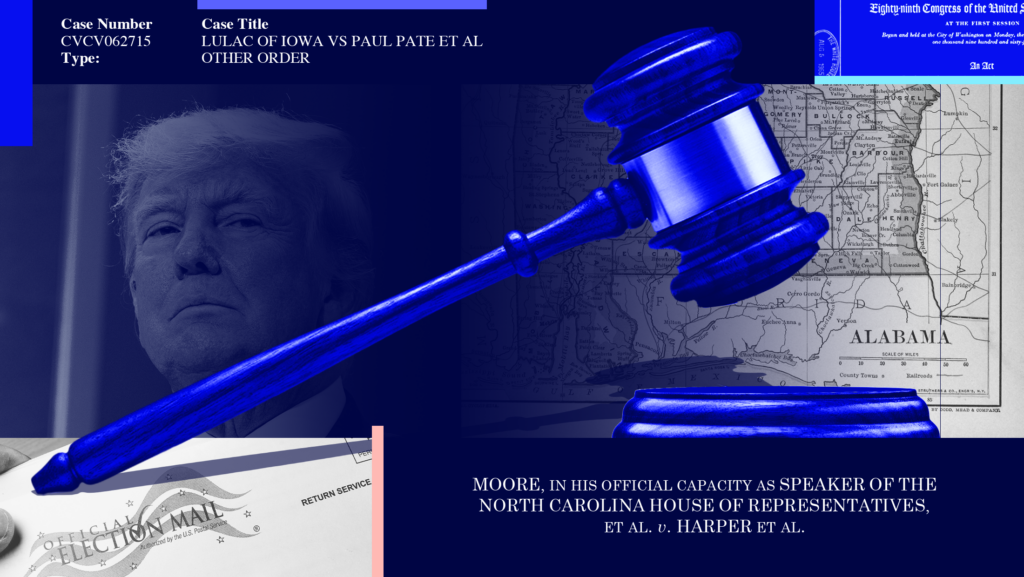Democracy Was on the Docket in 2023, and It Won

American democracy has never been perfect, and it has always faced challenges. Yet, the assault on free and fair elections occasioned by former President Donald Trump and his supporters has little historical precedent.
Over the last few years, we have experienced a never-ending series of attacks on our democracy by a man who stands for nothing other than his own power. We have seen one of our two major parties turn its back on the American experiment in favor of raw power.
For the last several years, the most powerful check on these efforts has been the courts. As imperfect as our judiciary is, it has undeniably been the strongest bulwark against the anti-democratic plot to curtail voting, rig election rules and subvert the outcome of free and fair elections.
In the run-up to 2020, the courts protected the right to vote in the face of a world-wide epidemic. After the election, the judiciary rejected more than five dozen lawsuits filed by Trump and his allies to overturn the election results. In the years that followed, courts sided with voters against a tidal wave of new voter suppression laws.
Despite these victories, 2023 began with a dark cloud hanging over our democracy. Two critical cases were awaiting decisions in the conservative 6-3 Supreme Court. Pundits and prognosticators predicted the worst — that both cases would be lost and voting rights would be set back for a generation.
They were wrong. The courts did their job. Democracy was protected.
The first of those cases, Moore v. Harper, was the most important. Over the last two decades, conservative legal groups had concocted a legal theory that state courts were powerless to review or strike down state laws that restricted voting in federal elections or rigged congressional maps. Conservatives thought Moore would be the vehicle for the Court to adopt this fringe independent state legislature theory. Instead, the Court rejected it and reaffirmed the role of state judges in protecting free and fair elections.
The second Supreme Court case involved the Voting Rights Act (VRA). Alabama thought it could use that case, Allen v. Milligan, to gut the remaining main protection of the VRA, Section 2. Instead, the Court reaffirmed 40 years of jurisprudence and interpretation of this critical law. The result is that next fall, Black Alabamians will have the opportunity to elect two congressional candidates of their choice.
As it was in previous years, one of the main story lines in 2023 is the staggering record of losses Republican lawyers had in court.
These were not the only successes for redistricting in court. Following the decision in Allen, federal courts in Louisiana and Georgia similarly struck down congressional and state legislative maps for violating the rights of Black voters. In a separate case, a three-judge panel struck down South Carolina’s congressional map for violating the constitutional rights of Black voters by racially gerrymandering a critical swing district.
Perhaps the biggest redistricting victory of the year came earlier this week, when New York’s highest court ordered the state’s Independent Redistricting Commission to redraw the state’s congressional map in time for 2024. This has the potential for Democrats to gain four to six new seats next year.
Democracy did not only win in redistricting cases, the courts protected voting rights as well.
In Pennsylvania, the courts rejected two Republican lawsuits aimed at restricting mail-in voting. In a third Pennsylvania victory, a federal court struck down the state’s rejection of otherwise valid mail-in ballots that have an incorrect or missing date on the outer envelope.
Voters in Georgia and Florida both gained relief from key portions of new laws prohibiting them from receiving food and water while waiting in long voting lines. Georgia also saw its law that required mail-in voters to put their birth date on their absentee ballot envelope struck down. Florida had its newest voter suppression law, enacted just this year, partially blocked.
In the Lone Star State, a federal judge struck down Texas’ rule requiring clerks to reject mail-in ballots if the ID number did not match the voter’s registration record. Iowa’s so-called English-only law, which mandated that all election materials be in English, was invalidated. Arizona’s latest effort to make voter registration more difficult met a similar fate. And, in Michigan, after that state’s voter transportation ban was challenged in court, the Legislature wisely repealed it.
This year also saw important developments against election deniers. In Arizona, Republican efforts to overturn the results of the 2022 elections dragged into this year, but with no success. Not only were Kari Lake and other failed election denier candidates unable to prevail in court, their lawyers were sanctioned for filing frivolous lawsuits. Meanwhile, after refusing to properly certify the 2022 election and losing in court, Republican officials in Cochise County, Arizona were indicted in 2023.
Perhaps most importantly, Trump was indicted in Washington, D.C. for his effort to overturn the 2020 election. In Georgia state court, he was one of 18 defendants indicted for racketeering in connection with his effort to subvert that state’s 2020 presidential results. In addition, fake electors in Michigan and Nevada were indicted, while criminal investigations continue in several other states.
Sprinkled in among all these lawsuits were numerous cases where Republicans failed in court to make voting more difficult. As it was in previous years, one of the main story lines in 2023 is the staggering record of losses Republican lawyers had in court.
For that, as well as the victories for voters, we can all be grateful. For another year at least, democracy was on the docket and it won.